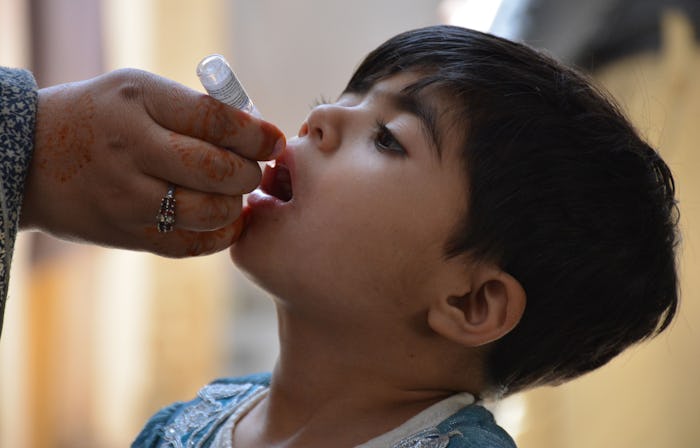Life

4 Anti-Vaccination Arguments & How To Respond To Them
Vaccination is a hot button issue, and it has been for nearly two decades. According to anti-vaxxers, many of the immunizations children receive are risky, they are dangerous, and they are downright unsafe, but pro-vaxxers believe the opposite. Immunizations are helpful and imperative. Vaccinations save lives. But which belief is correct? Which statement is a fact? Well, when I became pregnant with my own daughter, I went to the source: I turned to science, and, according to the literature and the studies, vaccinations are not only essential and reliable, immunizations are safe. But if that is true, how — and why — are there so many anti-vaccination arguments, and what's the best response to them?
Vaccination safety came into question in 1998, when Dr. Andrew Wakefield published a research paper, entitled “Ileal-lymphoid-nodular hyperplasia, non-specific colitis, and pervasive developmental disorder in children,” in the The Lancet, a peer reviewed medical journal. In it, Wakefield claimed there was a link between vaccinations and autism. Specifically, there was a link between the MMR vaccine — measles, mumps, and rubella — and autism. However, not everyone was convinced by the report, and for good reason. In 2010 — thanks to the hard work of an investigative journalist named Brian Deer — it was determined Wakefield falsified information and intentionally manipulated data. The study was retracted and Wakefield was stripped of his medical license, according to the Huffington Post. But that was six years ago. (Six years!) So why does the “to vax, or not to vax” question remain, and how can you respond to the many — and varied — anti-vaccination arguments? Here are a few common anti-vaccination arguments with a few solid ways to respond, because the safety and health of children is paramount.
1. "Sure, Wakefield’s study may have been unethical, unfounded, and completely inaccurate, but there’s also no proof that vaccines don’t cause autism."
Actually, there is. In 2013, the American Academy of Pediatrics released a list of more than 40 studies that proved there was no “link between autism and [the] MMR vaccine, thimerosal, multiple vaccines given at once, fevers or seizures.” What’s more, in a 2015 press-release, the American Academy of Pediatrics added “claims that vaccines are linked to autism, or are unsafe when administered according to the recommended schedule, have been disproven by a robust body of medical literature. [And i]t is dangerous to public health to suggest otherwise.”
2. "Yeah. Well tell that to “so-and-so.” Their child developed autism after being vaccinated."
Yes, children develop autism. It happens. And sometimes is happens shortly after one receives a vaccination. (Or at least that is how it appears.) However, correlation isn’t the same as causation, according to Stats.org, and just because an autism diagnosis may occur around the same time as an immunization does not mean the immunization was the cause.
Don't believe me: Consider smoking. Smoking causes lung cancer, according to Stats.org, because the act of smoking causes cancer cells to multiply and grow. However, smoking does not cause high alcohol consumption even though research has proven there is a correlation between the two. (Correlation is defined as an event in which one action occurs with another but is not necessarily the cause.) And that is the case with vaccinations and autism: they may occur in tandem with one another but vaccinations do not cause autism. They. Just. Don't.
(If you need further proof, check out Redditor Jasonp55’s awesome correlation study, which showed organic foods are as much to blame for autism as vaccinations are.)
3. "Vaccination is MY choice, and it’s nobody’s business if I immunize my kids."
Personally, this argument enrages me. It infuriates me, and it pisses me off, but my opinion is far from a fact, so let’s get “the facts": let’s talk about herd immunity. According to NOVA, herd immunity is “a means of protecting a whole community from disease by immunizing a critical mass of its populace. [Because v]accination protects more than just the vaccinated person...vaccination can also protect people who haven't been [and cannot be] immunized.” However, in order for herd immunity to work, a certain percentage of any given population must be vaccinated, so while you may think the decision to vaccinate (or not vaccinate) your child is “your choice” and “your business,” it isn’t. And your decision could be putting your entire community at risk — it could put children with compromised immune systems and cancer patients at risk.
4. "'Natural' immunity is always better than the immunity that comes from vaccination."
“Natural” immunity is the immunity one develops after someone is exposed to a specific disease, which means a child must contract and successfully fight off an infectious illness to become immune. And while it is true that natural immunity lasts longer than vaccine-acquired immunity, the risks outweigh the benefits — by far — and immunization is always recommended, according to The History of Vaccines (an educational resource from The College of Physicians in Philadelphia).
That said, the MMR vaccine does have side effects. In fact, any vaccination or medication can cause side effects. However, according to the National Vaccine Information Center, those side effects most commonly include things like a low-grade fever, skin rash, itching, swelling, reddening of skin, hives, and fatigue — but not autism.